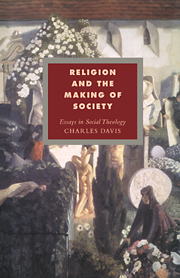Book contents
- Frontmatter
- Contents
- General editors' preface
- Acknowledgements
- Introduction: from the secular to the supernatural
- PART I Society, religion and human agency
- PART II Praxis, narrative and religious language
- PART III From the modern subject to the postmodern self
- 8 Our new religious identity
- 9 Post-modernity and the formation of the self
- PART IV The option for the future
- Index
- Cambridge Studies In Ideology And Religion
8 - Our new religious identity
Published online by Cambridge University Press: 18 December 2009
- Frontmatter
- Contents
- General editors' preface
- Acknowledgements
- Introduction: from the secular to the supernatural
- PART I Society, religion and human agency
- PART II Praxis, narrative and religious language
- PART III From the modern subject to the postmodern self
- 8 Our new religious identity
- 9 Post-modernity and the formation of the self
- PART IV The option for the future
- Index
- Cambridge Studies In Ideology And Religion
Summary
It sounds unbelievably banal to say it: but religious people are going through a crisis of identity today. Catholics, for example, used to have a clear-cut identity; it is not so now. The reader will forgive me for referring to myself, but my own case as a Catholic who publicly broke with his Church is particularly illustrative. If someone now asks me whether I am a Catholic, I do not know how to answer. I know that I do not fulfil the requirements for membership laid down in canon law, nor do I give assent to all the Catholic dogmas. On the other hand, I meet acknowledged Catholics who do not take seriously the canonical conditions for membership and who sometimes believe fewer Catholic dogmas than I do. Moreover, I am openly made welcome as a communicating fellow Catholic by Catholic groups and individuals, clerical and lay, both in North America and Britain. That could not have happened a few decades ago. What criteria should I use to decide my possible Catholic identity?
Again, whom should one recognize as a Christian today? A book appears, such as The Myth of God Incarnate, edited by the Christian theologian John Hick, denying a central Christian doctrine: the Incarnation in the sense in which it was defined by the Church Councils. There is a traditional response from some Christians, denouncing the authors as having apostatized from the Christian faith, but as the wider response shows there is not among the general body of those who call themselves Christians any consensus now at the doctrinal level.
- Type
- Chapter
- Information
- Religion and the Making of SocietyEssays in Social Theology, pp. 131 - 152Publisher: Cambridge University PressPrint publication year: 1993

